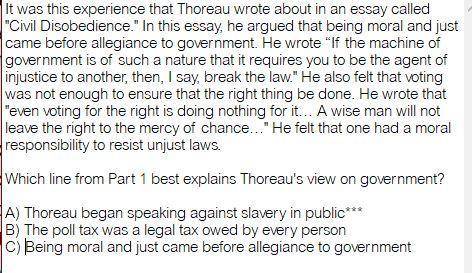
English, 05.02.2021 08:10 pringlexavier798
WILL GIVE BRAINLIEST plz help Civil Disobedience Part 1 Most people remember Gandhi and Dr. Martin Luther King, Jr. as reformers who practiced non-violent forms of protest and advocacy. Both effectively changed the popular opinion about emotional issues for their countries and brought in a wave of change that was long overdue. But the practice of non-violent protest, or civil disobedience, started long before either Gandhi or King. It began with a quiet, shy poet who is best known for writing a lot about a pond. Henry David Thoreau lived from 1817 until 1862, mainly in the area of Concord, Massachusetts. The issue that would tear the country apart in the 1860s had already begun dividing the nation. Thoreau was only 14 when Nat Turner led the slave rebellion in Virginia and was later hanged. In his late 20s, Thoreau began speaking against slavery in public, echoing the voices of freedmen like Frederick Douglass and Lewis Hayden. Thoreau believed that a government that supported slavery was corrupt and immoral. He was also deeply suspicious of government. For these and other reasons, Thoreau refused to pay his poll tax for a number of years. The poll tax was a legal tax owed by every person. It was basically a tax on one's body. After not paying for years, he was at last arrested. He spent only one night in jail, however, as a relative paid the tax for him. He was reportedly furious that any tax was paid on his behalf. It was this experience that Thoreau wrote about in an essay called "Civil Disobedience." In this essay, he argued that being moral and just came before allegiance to government. He wrote “If the machine of government is of such a nature that it requires you to be the agent of injustice to another, then, I say, break the law." He also felt that voting was not enough to ensure that the right thing be done. He wrote that "even voting for the right is doing nothing for it… A wise man will not leave the right to the mercy of chance…" He felt that one had a moral responsibility to resist unjust laws. Which line from Part 1 best

Answers: 1


Another question on English

English, 21.06.2019 18:00
What is the best revision of this statement from the body of a cover letter?
Answers: 1

English, 21.06.2019 20:00
How does it change your understanding of the laws to read them as a primary source rather than just a summary of laws?
Answers: 3

English, 22.06.2019 01:30
Read the excerpt from the dark game: true spy stories from invisible ink to cia moles. yet, by the time robert e. lee surrendered to ulysses grant at appomattox, virginia, some four years later, about 620,000 soldiers had died on the battlefields, more than american battle deaths in all other wars from the revolution through the vietnam war. what is the author’s primary purpose for including this detail? to inform readers about the differences between three military conflicts to persuade readers of the seriousness of the american civil war to entertain readers with tales from behind the lines of battle to encourage readers to visit battlegrounds in appomattox, virginia
Answers: 2

English, 22.06.2019 07:00
Pronoun clearly shows what is being referred to at specific person place or thing
Answers: 2
You know the right answer?
WILL GIVE BRAINLIEST plz help
Civil Disobedience Part 1 Most people remember Gandhi and Dr. Martin...
Questions



Mathematics, 12.11.2020 02:40




Biology, 12.11.2020 02:40


Mathematics, 12.11.2020 02:40



English, 12.11.2020 02:40

English, 12.11.2020 02:40

Mathematics, 12.11.2020 02:40


Spanish, 12.11.2020 02:40

Mathematics, 12.11.2020 02:40

English, 12.11.2020 02:40

Business, 12.11.2020 02:40

Mathematics, 12.11.2020 02:40




